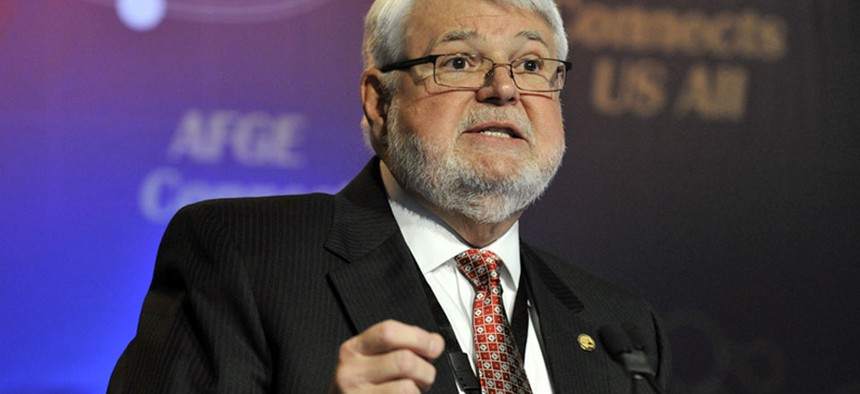
J. David Cox, AFGE National President AFGE
Mixed Reviews for Proposed Pension Contribution Hikes
Unions, lawmakers disagree on merits of compromise budget deal.
The budget deal has been struck.
To review, the compromise package to roll back sequestration cuts required by the 2011 Budget Control Act for two years targets federal employees’ pensions as expected. While current workers were spared, civil servants hired after 2013 would pay 4.4 percent of their annual salaries toward their defined retirement benefit. This marks a 1.3 percent increase from the current contribution requirement for new hires, though any employee hired in or before 2012 pays only 0.8 percent of their salary toward their pension.
Military retirees’ pensions would also take a hit, as the deal requires a less generous annual cost of living adjustment. Overall, the plan takes $12 billion in savings from federal workers.
So, what do federal employee advocates think of the deal? Well, the reviews are mixed.
The American Federation of Government Employees rejected the deal, saying the negotiators established a false choice between effective pay cuts and the ongoing fallout of sequestration.
“AFGE rejects the notion that there should be a trade-off between funding the programs to which federal employees have devoted their lives, and their own livelihoods,” said J. David Cox, the union’s national president.
Initial reports suggested congressional negotiators planned to adopt a provision of President Obama’s fiscal 2014 budget proposal that would have increased all existing federal employees’ contribution rates to 2 percent. Washington, D.C.-area and progressive lawmakers -- including one of the deal’s chief negotiators, Rep. Chris Van Hollen, D-Md. -- fought hard against that proposal, which would ask the civilian workforce to give up $20 billion. Ultimately, the legislators brought the total savings at civil service workers’ expense down to $6 billion.
In that concession, some federal employee groups found enough comfort to back the deal.
“While we think federal employees continue to contribute a disproportionate amount to deficit reduction and should not be included in this package, there is recognition in this deal that current federal employees already sacrificed again and again,” National Treasury Employees Union President Colleen M. Kelley said in a statement. “I am disappointed that the budget deal announced today proposes increases to federal employee retirement contributions for new hires; however, I am glad to see the numbers were significantly reduced from original proposals and that these retirement increases will not impact current employees.”
Joseph Beaudoin, president of the National Active and Retired Federal Employees Association, also offered tepid support.
"This is not a deal federal employees are happy with, but it may be one they are forced to accept,” Beaudoin said. “With improved funding levels, we hope this deal avoids additional furloughs and workforce reductions. The furloughs federal employees were forced to undertake in 2013 caused unnecessary financial strain and anxiety, and a reprieve from this stress in the next two years is welcome.”
Still, that peace of mind was not enough to quell all concerns. Some groups, such as the National Federation of Federal Employees, were simply unwilling to accept that their members -- or future members -- should make yet another concession.
“NFFE cannot support a budget deal that once again targets federal employees for budget offsets,” the union’s president, William Dougan, said in a statement. “The fact that the targeted cuts are less egregious than those Rep. Paul Ryan [R-Wis.] proposed earlier this year is a small consolation to the thousands of middle-class families that will suffer if this budget is adopted. We cannot stand idly by as Congress continues to erode federal employee compensation.”
Will It Pass?
Many of the most conservative members of the Republican caucus in both chambers of Congress have voiced their opposition to the deal, saying essentially the spending caps put in place by sequestration were good for deficit reduction and should therefore remain in place. For his part, House Speaker John Boehner, R-Ohio, called the far-right’s criticisms “ridiculous.”
House Democrats have not offered a cohesive take on the bill, with Minority Leader Nancy Pelosi, D-Calif., saying Wednesday she would wait to see what, if any, amendments were added to the bill before advising her caucus. Many Democrats expressed discontent that unemployment benefits, which are set to expire Dec. 28, were not extended as part of the deal.
Lawmakers who renounced proposals to raise pension contributions for current federal employees seem to be OK with the final compromise.
Van Hollen, who called the original pension proposal a “deal breaker,” offered support for the deal Tuesday.
“This agreement isn’t perfect, but it is certainly better than no agreement at all,” he said in a statement. “This difficult negotiation has gone through many phases. The final product replaces part of the job-killing sequester without disproportionally hitting working families, including hundreds of thousands of public servants.”
Sen. Barbara Mikulski, D-Md., another early holdout representing many federal employees, said the deal has her backing because, to put it simply, it could have been worse.
“I’m deeply disappointed it requires some federal employees to pay more for their retirement,” Mikulski said. “For too long, federal employees have been scapegoats of deficit reduction…But because of this agreement, federal employees can get their cost-of-living increase and they will no longer face the uncertainties of furloughs and pay cuts. And I’m so relieved the agreement rejects the draconian proposal to make federal employees pay 5.5 percent more for their retirement.”
Should the bill clear Congress, it would likely receive the president’s signature. Obama announced his support for the deal Tuesday, saying it does not include everything he likes, but that it represents a “good first step.”







